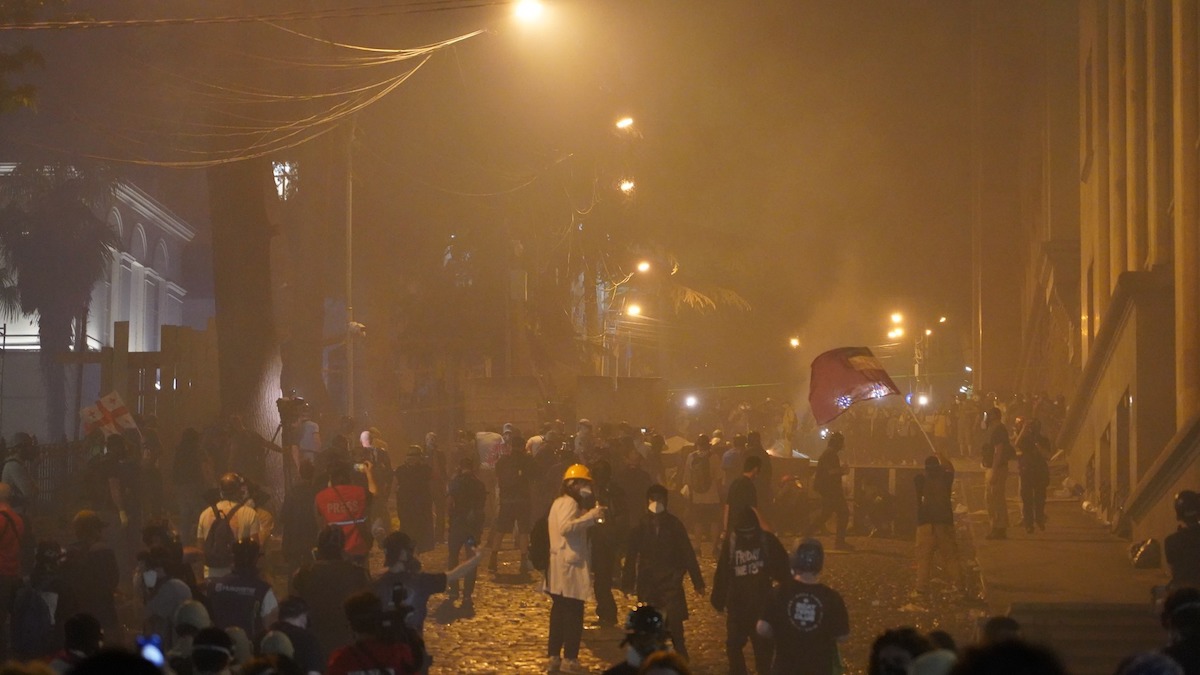Nine protesters still in custody over Georgia’s "foreign agents" law
Arrested protesters in Georgia
According to the Georgian Young Lawyers’ Association (GYLA), a thorough investigation into alleged abuse of power by law enforcement during the spring protests against the “foreign agent” law in Tbilisi has not yet been conducted. Meanwhile, the court has applied the strictest measure of detention to nine protest participants.
“GYLA is monitoring the criminal cases of individuals arrested during the protests against the ‘foreign agent’ law. Based on open sources, the organization has identified criminal cases against nine people.
All these cases are being heard by the Tbilisi City Court, where the strictest measure of detention has been applied to each defendant,” the statement reads.
The statement also highlights concerns over the lack of a thorough investigation into alleged abuses of power by law enforcement and the failure to hold those responsible accountable.
GYLA will continue to monitor the cases of the protest participants and keep the public informed.
Arrested protesters in Georgia
What’s important to know about Georgia’s ‘foreign agents’ law?
- The “Law on Transparency of Foreign Influence”, initiated by the ruling Georgian Dream party, was passed by Parliament on May 28, 2024. The legislation establishes a special registry for “foreign agent organizations,” defined as entities where more than 20 percent of funding comes from foreign grants. In a small and relatively poor country like Georgia, this effectively includes nearly all non-governmental organizations.
- The Parliament adopted this law despite massive protests, persistent calls from Georgia’s Western partners, and the opinion of the Venice Commission of the Council of Europe.
- After the passage of the law, the US announced the first package of sanctions against the “Georgian Dream” government. Secretary of State Antony Blinken warned of a “comprehensive review of US-Georgia cooperation.”
- The European Union also took retaliatory measures. In early July, the EU halted €30 million in aid to Georgia and warned of additional measures to come. Senior EU officials have repeatedly indicated that this law distances Georgia from the EU.
- On July 11, the U.S. House Committee on Foreign Affairs passed the Megobari Act, which imposes sanctions on those involved in passing the “foreign agents” law.
The Georgian government’s main argument is that similar laws exist in the U.S. and several European countries, including France. According to Georgian Dream, every country has the right to protect itself from foreign influence and demand transparency from its organizations.
However, this comparison is inaccurate because:
The American law FARA (Foreign Agents Registration Act), to which Georgian Dream refers, was enacted in the U.S. in 1938, before World War II, and aimed to protect the American public from Nazi propaganda. Neither then nor now did FARA apply to America’s allies and friendly countries.
In France, the law on “Foreign State Influence” includes a specific list of countries to which the law applies. This list comprises countries whose influence France considers a threat, including Russia, China, Turkey, and Iran. The French version also specifically states that this law does not apply to EU countries. The Georgian version lacks such provisions. Consequently, this law directly impacts organizations funded by the U.S. and the EU—friendly and partner countries that support democratic processes and numerous vital projects in Georgia, ranging from healthcare and infrastructure to strengthening civil society.
Furthermore, FARA stipulates that the law does not apply to media or NGOs, only to lobbying organizations. The Georgian version does not have this clarification.
Overall, the Georgian law is similar to the Russian law, which primarily affected media and the NGO sector. As a result, all non-governmental and media organizations not controlled by the Kremlin have been shut down in Russia. Hence, the Georgian law has been dubbed the “Russian law.”
It’s also important that this law contradicts EU legislation. When a similar law was adopted in Hungary, it was annulled by the European Court of Human Rights because it was directly aimed at silencing the media and oppressing NGOs.




















